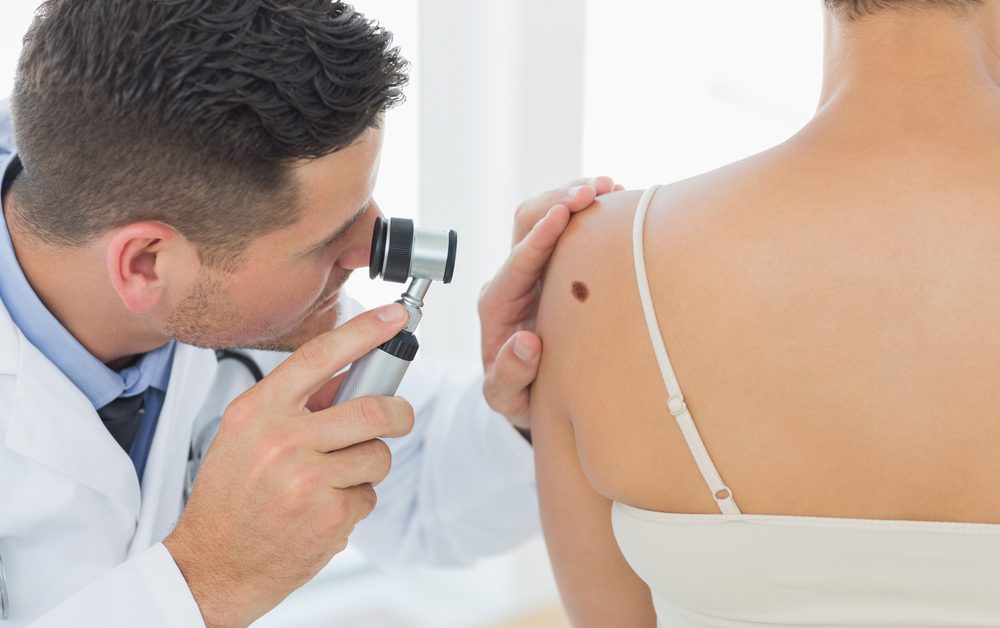Blog
Do Dermatologists Treat Skin Cancer?

How serious is skin cancer and what type of doctor should you go to for an accurate diagnosis and treatment? In most cases, skin cancer is not serious and can be successfully treated by a dermatologist – especially if it is diagnosed early.
Dermatologists provide a wide range of different treatments for the 3 different types of skin cancer:
- Melanoma is the most serious of the 3 types of skin cancer and can be fatal if it spreads to other parts of the body such as the glands or organs. It commonly presents as an atypical mole or develops inside an existing mole. A dermatologist will treat melanoma in its early stages but will refer patients to a surgical oncologist in later stages.
- Basal Cell Carcinoma is the most common type of skin cancer and affects the deepest layer of the epidermis. It appears as a small sore or scar on the skin that doesn’t heal on its own or can present as a waxy bump. The cancer grows slowly and rarely metastasize. They are generally the result of extended exposure to the UV rays of the sun and can be successfully treated by a dermatologist.
- Squamous Cell Carcinoma affects the uppermost layers of skin cells and presents as a scab or crust covering skin that is red and inflamed. It is generally caused by long-term exposure to the sun and can be treated successfully by a dermatologist.
A dermatologist may treat skin cancer in one of the following ways or use a combination of treatments. The treatment will depend on the type of cancer as well as the stage of the cancer.
1. Surgery
This is the most common and effective strategy to remove or excise skin cancer cells or moles. There are a number of different surgical options available including:
- Cryosurgery uses liquid nitrogen to freeze the affected area and effectively kill cancerous cells. It is commonly used to remove moles or other lesions and is performed on an outpatient basis within the dermatologist rooms.
- Moh’s surgery removes cancerous skin cells one layer at a time. Each layer is checked for cancer cells before the next layer is removed. The surgery is largely considered to be the most effective treatment to eliminate skin cancer but should only be performed by a skilled dermatologist.
- Surgical excision involves the removal of skin cancer growths with a scalpel after the affected area has been numbed with a local anesthetic. While highly effective, it does remove a large amount of healthy tissue and scarring is common.
- Curettage is the process of scraping skin cells one layer at a time with a tool called a curette. The skin is cauterised after each layer is removed to reduce bleeding. The procedure is commonly used where cancer affects only the top layer of the skin such as Squamous Cell Carcinoma.
2. Radiotherapy
Once again, there are a number of approaches to radiotherapy to treat skin cancer cells. This procedure is generally a targeted approach to reducing the size of skin cancer growths or tumours.
However, radiotherapy is most commonly used to treat non-melanoma cancer such as Basal Cell Carcinoma and Squamous Cell Carcinoma.
Treatment requires multiple, short sessions that are painless and does not result in scarring. The success rate is around 95% for non-melanoma skin cancer.
3. Laser And Phototherapy Treatments
Laser therapy is commonly used to eliminate the top layer and upper layers of cancer cells in Squamous Cell Carcinoma.
Phototherapy (light therapy) treatments involve the application of a solution to the affected area that will be activated by exposure to light, effectively eliminating cancer cells in the top layers of the skin.
It is important to visit a dermatologist for an accurate diagnosis and to discuss the different treatment options that are available for skin cancer.
Searching for and finding a trustworthy dermatologist in Melbourne isn’t easy. However, if you need to seek advice from a trusted and experienced dermatologist, look no further than Brighton Dermatology.
We are able to deal with a large range of skin diseases and disorders and help you to restore your health and confidence.
Please call us today for a consultation on (03) 9592 7474 or contact us via our website.

